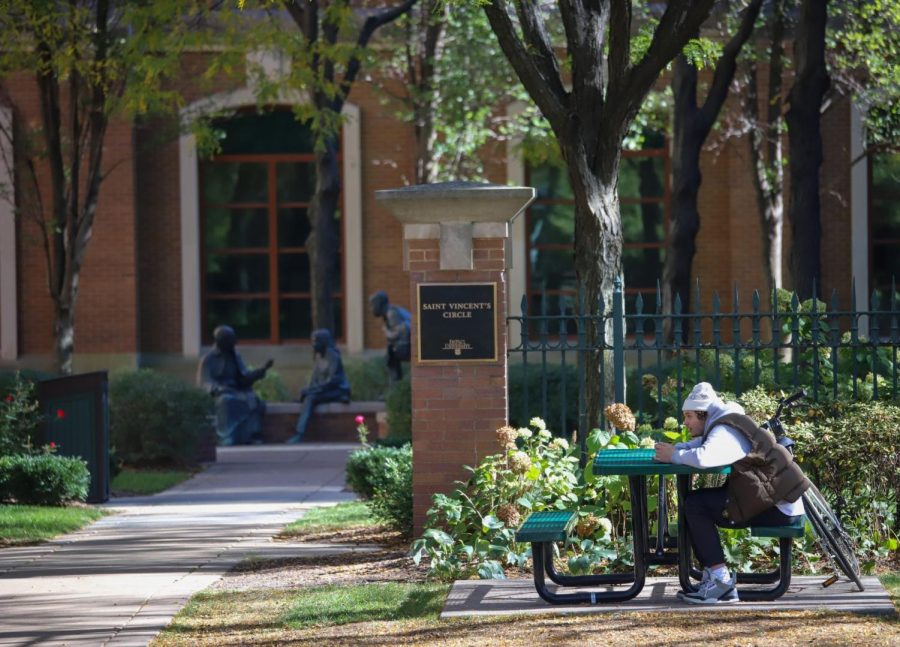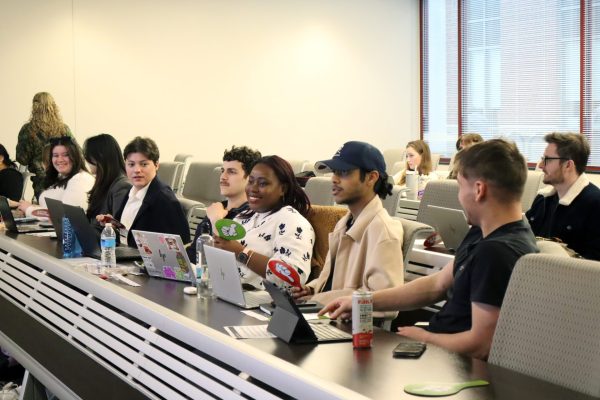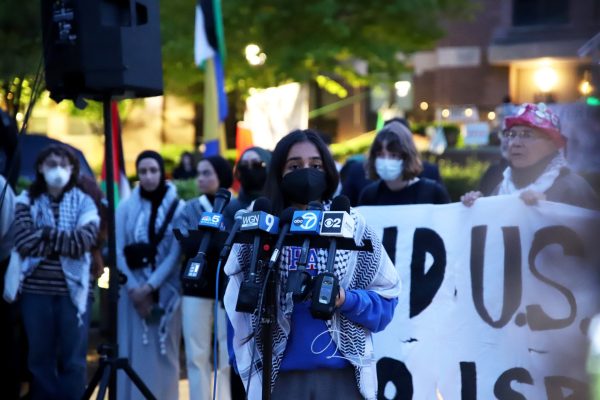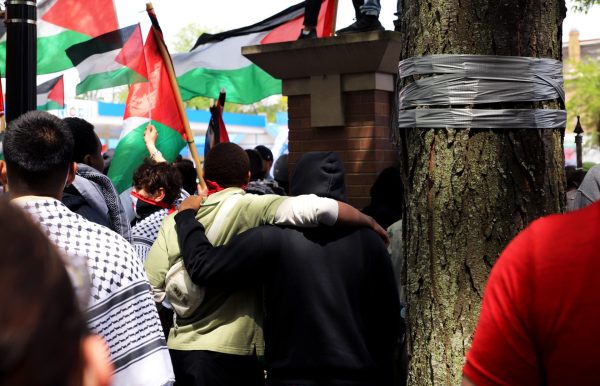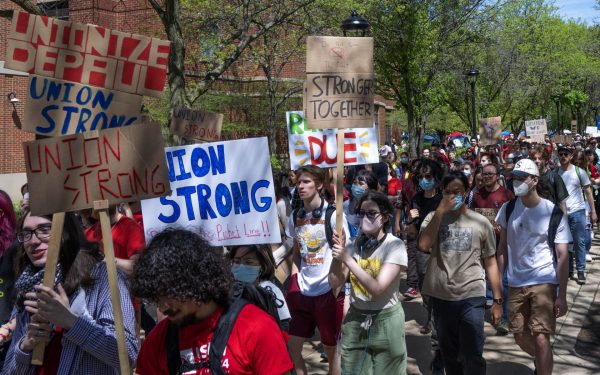Humanities center hosts discussion on comfort women
A student sits at Saint Vincent’s Circle in DePaul’s Lincoln Park campus. Students have returned to campus after a full year of online classes due to Covid-19.
DePaul’s Humanities Center hosted a Zoom webinar about the history and social relevance of comfort women in Japan and the Philippines this past week. According to the event’s organizer and the head of the Humanities Center Yuki Miyamoto, 150 participants signed up. Miyamoto is also a professor in the religious studies department. Four panelists (two professors and two nonprofit organizers) each took a brief turn to discuss the topic from their academic point of view.
These speakers are all extremely close to the issue of comfort women – boys, girls and women who were forced to become sexual slaves for the Japanese military throughout the 1930s and ‘40s.
“[The speakers] are not just experts in this field, but also they are actually facing this kind of battle. They have been harassed and attacked verbally, you know, social media kind of thing,” Miyamoto said.
When I spoke to Miyamoto prior to the event and inquired how one plans an event centering around something so potentially triggering, the professor expressed concern focused first and foremost on the event’s panelists.
“I’m not really concerned about upsetting people, but I’m more concerned about protecting my speakers, our guests. And how we can protect them from being harassed,” Miyamoto said.
Alexis Dudden, a professor at University of Connecticut describes what happened to comfort women.
“[The] transnational trafficking of boys, girls, women, [which is] one of the 20th century’s greatest crimes against humanity, something that the UN has recognized as such… something that continues today,” Dudden said.
Dudden stressed the importance of looking at the historical significance of the word ‘comfort women’ itself and how it’s changing.
“We talk about a euphemized expression — ‘comfort women,’” Dudden said. “‘Comfort women’ is the wrong word, we’re talking about sexual slavery.” “Historians have settled on a number of 250,000 victims … between 1932 and 1945 … To the best of our knowledge, [there are] fewer than 50 living survivors.”
Almost every panelist brought up the controversial comfort women statues from around the world — about 50, it is estimated by Dudden. Miyamoto said that it causes the topic of comfort women to become much deeper and complex, especially in a contemporary context.
“This is an issue … Especially it flared up when comfort women statues were being built in different parts of the countries, like in the U.S. as well, in South Korea, in the Philippines, which took place maybe in the last decade or so. It has always been an issue but this adds to another layer to the issue,” Miyamoto said.
Sharon Cabusao-Silva, director of Lila Pilipina, a non-governmental organization in the Philippines, joined from Manila. She described Lila Pilipina’s exerted efforts to protest while this situation was still unfolding.
“Lila Pilipina repeatedly marched towards the Japanese embassy even during the pandemic,” Cabusao-Silva said. “[There’s a] comfort women statue on Rojas Boulevard near the Japanese embassy … the statue was removed by the Philippine government three months later, and it went missing a few days before the supposed reinstallation.”
Naoko Okimoto works with an educational organization called Pamana Rin Tayo, translated to ‘we are also successors’ in English.
“We organized online classes connecting Lila Pilipina and colleges,” Okimoto said. “We also worked with Filipino youth. They also do not call comfort women by that name,” Okimoto said. They address them as “lola”, Tagalog for grandma, which inspires respect for the survivors.
Tomomi Yamaguchi, an anthropologist and professor at Montana State University, discussed contemporary and past Japanese politics and how they play a role in how comfort women are viewed.
“This anti-comfort women discourse became really mainstream,” Yamaguchi said. “It existed in the ‘90s with the denialists … to create revisionist textbooks.”
She recalls receiving hundreds of revisionist pamphlets, seemingly expected to distribute them to her students. She points out how quickly and easily information like this can spread.
“When they say really denialist comments on the comfort women issue, the media, [and] opposition parties, they just ignore,” Yamaguchi said. “There’s so little discussion on comfort women issues, still … What’s influential is social media … they really can fall into denialism so easily, because that information is really abundant.”
Cabusao-Silva works directly with survivors in her NGO.
“They had to do it because they were forced,” Cabusao-Silva said. “it’s never a choice for any woman… It is almost 30 years of struggle… our lolas fought against the most difficult conditions… more than half a century of silence and stigma.”
Similarly to her fellow panelists and Miyamoto, Cabusao-Silva drew a contemporary lens over the issue as well. Its implications can point to something more growth-oriented in future.
“Only by learning from the past can we learn to deal with the present,” Cabusao-Silva said.
Miyamoto urges participants of the event to go beyond.
“Learning about others, learning about history, that’s great,” Miyamoto said. “But then I’d like the audience to reflect upon it … what kind of progress we’ve made. Then the question becomes more about us, we have to do something. It’s not like, oh, those poor people, that’s unfortunate. And?” Miyamoto said.
Miyamoto, as well as the four panelists, continued to stress how important this issue is to discuss – partially because of its sheer magnitude. “One panelist will show this map – how many comfort stations were set up during the war – it’s like all over. There are so many. Which means, so many Japanese soldiers. So many comfort women were involved in this. And why don’t we know about it?… Those many people were involved and still so many people don’t know about it, so what does that mean? And what’s this silence about?” Miyamoto said.
Upcoming Humanities Center events throughout the rest of the quarter include Everyday Life in the Greater Middle East on Feb. 8 as well as a Holocaust-centered event on Feb. 22, mentioned by Miyamoto.


